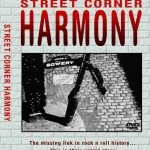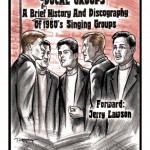Â
By Sally Deering
Acappella groups – four or five guys singing harmonies with no back-up band – bridged the gap between 1950s Doo-Wop and 1960s rock and roll, but until now, little has been written about that time in music history when teenagers harmonized on street corners, inside subways and underneath train trestles searching for the echo that gave them their sound.
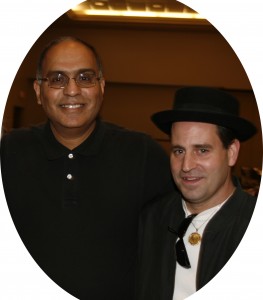
Abraham Santiago grew up in Jersey City and remembers the days he sang tenor in The Concepts,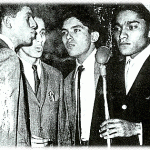 a street corner acappella group of fellow students from Ferris High School in Jersey City. Santiago, who now resides in Chicago, took his memories of those days and collaborated on a book and documentary about the acappella era with Steve Dunham, an acappella enthusiast and music producer in Las Vegas with a mammoth acappella record collection and a passion for singing street harmonies.
a street corner acappella group of fellow students from Ferris High School in Jersey City. Santiago, who now resides in Chicago, took his memories of those days and collaborated on a book and documentary about the acappella era with Steve Dunham, an acappella enthusiast and music producer in Las Vegas with a mammoth acappella record collection and a passion for singing street harmonies.
 “Acappella Street Corner Vocal Groups:  A Brief History and Discography of 1960s Singing Groups,” (Mellow Sound Press, Chicago,167 pgs;) chronicles every street corner acappella group ever recorded from that time like  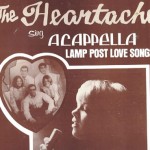 Joanne and the Heartaches, the Royal Counts
Joanne and the Heartaches, the Royal Counts 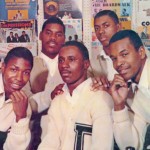
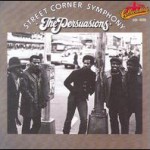 and the Persuasions; and the record companies that produced their songs, like Snowflake, Relic and Catamount. The documentary, “Street Corner Harmony: The Missing Link in Rock and Roll History,” narrated by record producer Wayne Stierle delves deeper into the singers’ lives and the genre of acappella music. Both the book and the documentary are touchstones to a bygone era, the time between the 1950s and 1960s, when musical tastes shifted to British rockers like The Beatles and short-haired teens singing acappella became as old-hat as the Hi-Fi record players that spun their songs.                                                                                                                                                                                                                                                                                                                                                                                                                                                                                                                                                                                                                                                                                                                                                                                                                                                                                                                                                                                                                                                                                                                                                                                                                                                                                                                                                                                                                                                                                                                                            Â
and the Persuasions; and the record companies that produced their songs, like Snowflake, Relic and Catamount. The documentary, “Street Corner Harmony: The Missing Link in Rock and Roll History,” narrated by record producer Wayne Stierle delves deeper into the singers’ lives and the genre of acappella music. Both the book and the documentary are touchstones to a bygone era, the time between the 1950s and 1960s, when musical tastes shifted to British rockers like The Beatles and short-haired teens singing acappella became as old-hat as the Hi-Fi record players that spun their songs.                                                                                                                                                                                                                                                                                                                                                                                                                                                                                                                                                                                                                                                                                                                                                                                                                                                                                                                                                                                                                                                                                                                                                                                                                                                                                                                                                                                                                                                                                                                                            Â
 “In 2004 I began thinking about why no one ever wrote about the acappella era or the Golden Age of Acappella as some call it,” Santiago says. “I starting writing it, but I’m not a good writer so I asked around and I found Steven Dunham. We hit it off really well considering I didn’t know him and he didn’t me. We started working together and in 2006 the book was published under Mellow Sound Press. In that same year a native Jersey City music critic Jim De Rogatis who lives in Chicago reviewed our book for the Chicago Sun Times. The following year the book was reviewed by Soul Patrol.com and we won an award.”
 Originally from Brooklyn, Dunham resides in Law Vegas where he owns the record company Street Corner Entertainment and sings with two acappella groups, The Chaperones and the Emerald Dreams, whose songs are part of the documentary’s soundtrack. Dunham says he collaborated with Santiago because he believed the history of acappella recordings of that time needed to be preserved and so far, no one else had done the job.
 “We wanted to preserve the traditional street corner singing in the northeast in that time period,” Dunham says. “We felt it was an important piece of rock and roll and American history to preserve this genre before it was completely forgotten about and the memories passed away.” Â
The Way it Wa-a-as Â
Back in the early 1960s, when Santiago sang with The Concepts, he and his buddies, lead singer Amed Valentine, baritone Ed Rivera and first tenor Juan Perez were always on the lookout for the right backdrop for their acoustic sound. When they weren’t harmonizing on Jersey City street corners, they sang under train trestles and in subways, too.
 “We were always looking for the echo, the hallmark of that elusive dream to make it big,” Santiago says. Â
The Concepts sang R&B/Soul songs they imitated from African-American singing groups of the 1950s. That was the standard for how they wanted to sound, but what they really wanted was the opportunity to record their songs, have them played on the radio and sold in record stores. Â
“Today anyone can make a recording at home, press out a CD and sell it,” Santiago says. “In the 1960s you couldn’t do that. A record company had to hire and record you and you became part of that record company’s label.” Â
The Concepts recorded for Catamount and Cat Time labels and their songs were produced by Stan Krause who owns a record shop in Journal Square in Jersey City. Krause recorded many groups including the Persuasions, one of the best known acappella groups in history, Santiago says.Â
“Independent record labels recorded various groups from Jersey City and other surrounding urban cities like New York,” Santiago says. “Those recordings were played on the radio and immediately, the birth of acappella came into existence. Before long acappella shows were attracting large audiences at the State Theatre in Journal Square and the Palace on Newark Ave in Jersey City and in Hackensack and New York. It just exploded and a new pop genre was created. It was a small niche within the music industry.” Â
Dunham says many of the acappella groups weren’t taken seriously in the music industry and yet they have influenced groups of the past forty-five years as well as the collegiate acappella circuit. Even shows like NBC’s “Sing Off” where acappella groups of all ages and backgrounds compete for a recording contract owe their success to the guys singing on street corners back in the day.
 “If it wasn’t for the 60s acappella groups, this type of singing would never happen,” Dunham says.Â
 Too young to have experienced the first wave of acappella singing, Dunham, now in his 40s, was just 11 years-old when he became interested in acappella singing. It was the late 1970s and he and his buddies would harmonize on his Brooklyn stoop, singing classics like “In the Still of the Night,” and songs by the Stylistics.
 “Street corner singing is a neighborhood thing,” Dunham says. “It’s not just about the music; it’s about the culture of the northeast. It was a way of expression similar to how rap and hip-hop started.”
 Both Santiago and Dunham are pleased with the reception to the book and are discussing a sequel with new information they’ve discovered since publishing it. Santiago would also like to have the documentary shown in Jersey City, the place where acappella music began for The Concepts and other acappella groups that came and went over the years.
 “For teenagers in Jersey City and along the corridor that stretches from Boston to Philadelphia, singing was their favorite past-time,” Santiago says. “Guys didn’t play soccer or basketball as we do now, they would get together and sing. It was a way of connecting with each other and to potentially connect with a person of the opposite sex. If you could sing and you were in a vocal group you were cool.”
 To purchase “Acappella Street Corner Vocal Groups,” and or the DVD call QP Distribution at 888-281-5170 – or send an email to [email protected] (The book is $10; the DVD is $14.95, plus shipping and handling.)
to read more about these 1960s Premiere Acappella groups of the 1960s visit www.beaudaddy.com
Â
Â
